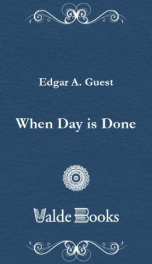Guest Edgar Albert

Edgar Albert Guest (August 20, 1881, Birmingham, England – August 5, 1959, Detroit, Michigan) (aka Eddie Guest) was a prolific American poet who was popular in the first half of the 20th Century and became known as the People’s Poet. In 1891, Guest came with his family to the United States from England. After he began at the Detroit Free Press as a copy boy and then a reporter, his first poem appeared December 11, 1898. He became a naturalized citizen in 1902. For 40 years, Guest was widely read throughout North America, and his sentimental, optimistic poems were in the same vein as the light verse of Nick Kenny, who wrote syndicated columns during the same decades. From his first published work in the Detroit Free Press until his death in 1959, Guest penned some 11,000 poems which were syndicated in some 300 newspapers and collected in more than 20 books, including A Heap o' Livin' (1916) and Just Folks (1917). Guest was made Poet Laureate of Michigan, the only poet to have been awarded the title. His popularity led to a weekly Detroit radio show which he hosted from 1931 until 1942, followed by a 1951 NBC television series, A Guest in Your Home. When Guest died in 1959, he was buried in Detroit's Woodlawn Cemetery. His work still occasionally appears in periodicals such as Reader's Digest, and some favorites, such as "Myself" and "Thanksgiving," are still studied today. Guest received a mention in Lemony Snicket's The Grim Grotto, though not in a particularly favorable manner. Dorothy Parker is the reputed author of one of the most quoted appraisals of his work: "I'd rather flunk my Wasserman test/ Than read the poetry of Edgar Guest." His great-niece Judith Guest is a successful novelist who wrote Ordinary People. Guest was a close friend of Detroit Free Press editor Royce Howes, who served as Guest's long-time editor and later wrote Edgar A. Guest: A Biography (1953).[1] The Los Angeles Times reviewed: "His editor and longtime friend Royce Howes has written the biography Guest deserves... Royce Howes has done a biography of a likeable and human man in not too adulatory a fashion; and it is readable."[2] Guest's most famous poem is the oft-quoted "Home":
do you like this author?
What readers are saying
What do you think? Write your own comment on this book!
write a commentWhat readers are saying
What do you think? Write your own comment on this author!
write a commentBook list

When Day is Done
Series:
Unknown
Year:
Unknown
Raiting:
4/5
Edgar Albert Guest, was a prolific American poet, who was popular in the first half of the 20th century. His poems, humorous and sentimental, optimistic and charming, will present a reader a lot of pleasant minutes. Guest wrote some 11,000 poems which were collected in more than 20 books, including “When Day is Done”.
Show more
add to favoritesadd In favorites

The Path to Home
Series:
Unknown
Year:
Unknown
Raiting:
4.5/5
Edgar Albert Guest (1881-1959) (aka Eddie Guest) was a prolific American poet who was popular in the first half of the 20th century and became known as the People's Poet. After he began at the Detroit Free Press as a copy boy and then a reporter, his first poem appeared 1898. For 40 years, Guest was widely read throughout North America, and his sentimental, optimistic poems were in the same vein as the light verse of Nick Kenny, who wrote syndicated columns during the same decades. From his first published work in the Detroit Free Press until his death in 1959, Guest penned some 11,000 poems which were collected in more than 20 books, including A Heap O' Livin' (1916) and Just Folks (1917). Guest was made Poet Laureate of Michigan, the only poet to have been awarded the title. His other works include: Over Here (1918), The Path to Home (1919), When Day is Done (1921) and Making the House a Home (1922). --This text refers to the Paperback edition.
Show more
add to favoritesadd In favorites

Over Here
Series:
Unknown
Year:
Unknown
Raiting:
1.5/5
This book belongs to the pen of a famous American poet and writer of the beginning of the twentieth century Edgar Albert Guest. He was an extremely prolific author as his literary heritage includes more than 11 thousand poems most of which are very optimistic and romantic. Over Here is devoted to the events of World War I and it is definitely recommended to those readers who want to feel tragedy of the war and its influence on separate families.
Show more
add to favoritesadd In favorites
Book list

When Day is Done
Series:
Unknown
Year:
Unknown
Raiting:
4/5
Edgar Albert Guest, was a prolific American poet, who was popular in the first half of the 20th century. His poems, humorous and sentimental, optimistic and charming, will present a reader a lot of pleasant minutes. Guest wrote some 11,000 poems which were collected in more than 20 books, including “When Day is Done”.
Show more
add to favoritesadd In favorites

The Path to Home
Series:
Unknown
Year:
Unknown
Raiting:
4.5/5
Edgar Albert Guest (1881-1959) (aka Eddie Guest) was a prolific American poet who was popular in the first half of the 20th century and became known as the People's Poet. After he began at the Detroit Free Press as a copy boy and then a reporter, his first poem appeared 1898. For 40 years, Guest was widely read throughout North America, and his sentimental, optimistic poems were in the same vein as the light verse of Nick Kenny, who wrote syndicated columns during the same decades. From his first published work in the Detroit Free Press until his death in 1959, Guest penned some 11,000 poems which were collected in more than 20 books, including A Heap O' Livin' (1916) and Just Folks (1917). Guest was made Poet Laureate of Michigan, the only poet to have been awarded the title. His other works include: Over Here (1918), The Path to Home (1919), When Day is Done (1921) and Making the House a Home (1922). --This text refers to the Paperback edition.
Show more
add to favoritesadd In favorites

Over Here
Series:
Unknown
Year:
Unknown
Raiting:
1.5/5
This book belongs to the pen of a famous American poet and writer of the beginning of the twentieth century Edgar Albert Guest. He was an extremely prolific author as his literary heritage includes more than 11 thousand poems most of which are very optimistic and romantic. Over Here is devoted to the events of World War I and it is definitely recommended to those readers who want to feel tragedy of the war and its influence on separate families.
Show more
add to favoritesadd In favorites

Making the House a Home
Series:
Unknown
Year:
Unknown
Raiting:
1.5/5
This book belongs to the pen of a famous American poet and writer of the beginning of the twentieth century Edgar Albert Guest. He was an extremely prolific author as his literary heritage includes more than 11 thousand poems most of which are very optimistic and romantic. Making the House a Home is a pretty small book where the author expresses his thought on the difference between creating a house and a home. Guest claims that it is possible to build a house in a few months while it may take a few year to build a home. The book is highly recommended for those readers who want to learn how to add a special spirit to their house so that it can be named a real home.
Show more
add to favoritesadd In favorites

Just Folks
Series:
Unknown
Year:
Unknown
Raiting:
2.5/5
A volume of poetry by Edgar Albert Guest, a prolific American poet. His folksy, optimistic, simple and emotional poetry about everyday life was popular in the first half of the 20th century.
Show more
add to favoritesadd In favorites

A Heap O' Livin'
Series:
Unknown
Year:
Unknown
Raiting:
5/5
The book A Heap o' Livin' is the collection of Edgar Albert Guest’s poems, published in 1916.
Edgar Albert Guest known more as Eddie Guest was born in England, and then moved with his family to America in 1891. There he started to write very prolifically and soon his poems full of sentiment and optimism became very popular. Guest acquired the name the People’s Poet in the first half of 20th century. He left about 11,000 poems altogether.
Show more
add to favoritesadd In favorites
Edgar Albert Guest known more as Eddie Guest was born in England, and then moved with his family to America in 1891. There he started to write very prolifically and soon his poems full of sentiment and optimism became very popular. Guest acquired the name the People’s Poet in the first half of 20th century. He left about 11,000 poems altogether.
Show more
What readers are saying
What do you think? Write your own comment on this author!
write a commentif you like Guest Edgar Albert try:
readers also enjoyed
What readers are saying
What do you think? Write your own comment on this author!
write a commentGenre
if you like Guest Edgar Albert try:
readers also enjoyed
Do you want to exchange books? It’s EASY!
Get registered and find other users who want to give their favourite books to good hands!

